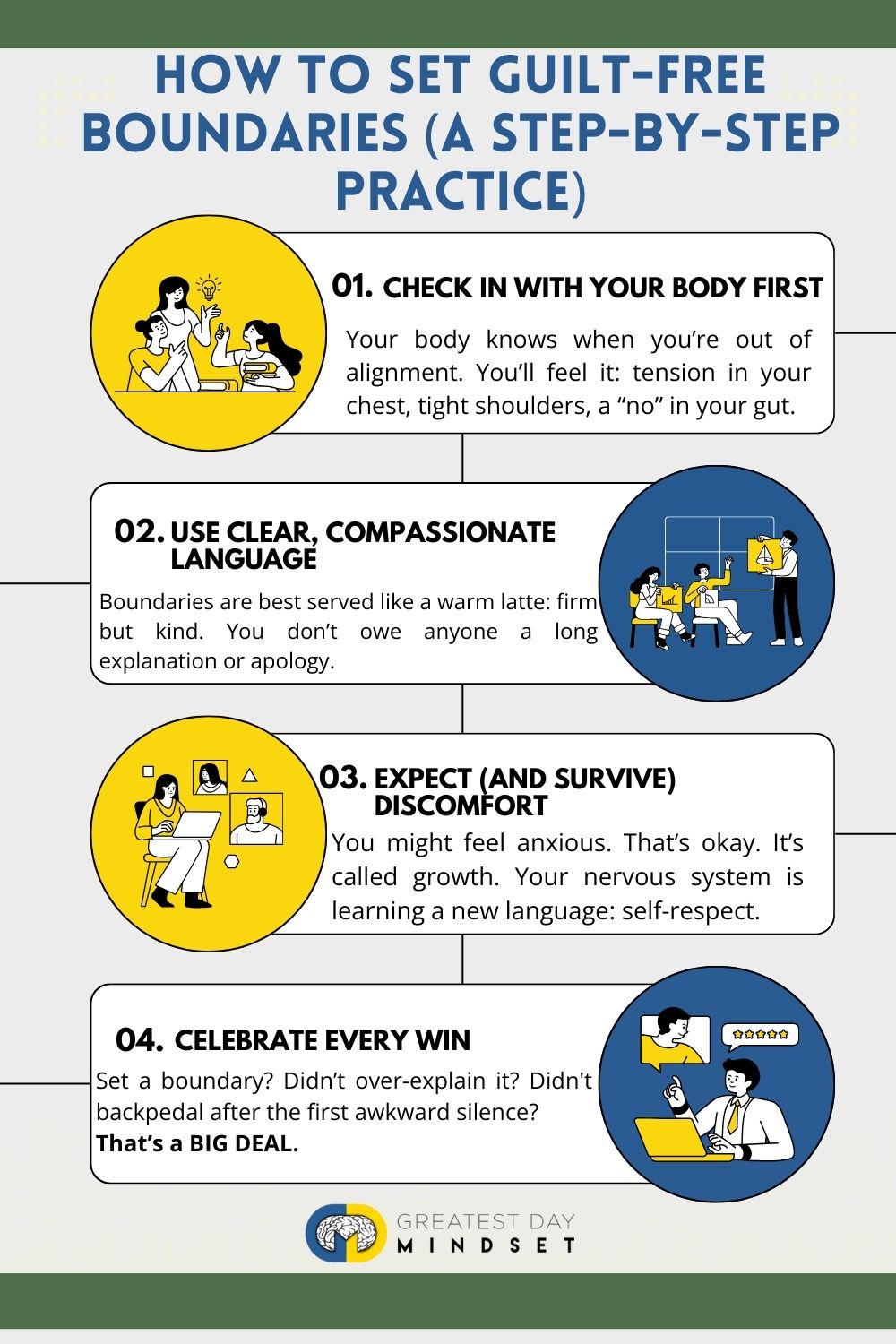How to Set Boundaries Without Feeling Guilty: The Self-Love Skill Nobody Taught You
Apr 24, 2025
Raise your hand if you've ever said “yes” when you desperately wanted to say “no.”
🙋♀️🙋♀️🙋♀️
Maybe you agreed to take on extra work, went to an event you had no energy for, or answered a late-night text because you didn’t want to “seem rude.”
We’ve all been there. And while it may feel like the polite or “good” thing to do…
You know what it actually is?
Self-abandonment.
And here's the kicker:
Most of us were never taught how to set healthy boundaries without feeling like a bad person.
Wait, What Are Boundaries?
Boundaries aren’t walls. They’re not ultimatums. And they’re not rude.
Boundaries are where you end and someone else begins.
They’re the expectations, limits, and standards that protect your energy, values, and peace.
Think of them like emotional hygiene:
You don’t need a reason to brush your teeth. You just do it—because you matter.
Same with boundaries.
Why Boundaries = Self-Love
Research shows that people who maintain clear boundaries experience:
-
Higher self-esteem (Journal of Personality and Social Psychology)
-
Less burnout (American Psychological Association)
-
Better relationships and communication
-
Stronger immune systems (yep, stress really gets to us)
Self-love isn't just about affirmations or bubble baths—it's about choosing yourself.
And setting boundaries is one of the boldest ways to do that.
So… Why Do We Feel So Guilty?
Let’s talk psychology for a sec.
People-pleasing is often a learned survival strategy.
If you grew up believing love = being agreeable, useful, or available 24/7, then setting a boundary feels like rejection—even when it’s actually self-protection.
Here’s what’s likely happening:
-
Your nervous system is registering boundary-setting as a threat.
-
Your inner critic is saying things like “You’re selfish” or “They’ll be mad at you.”
-
You’re confusing discomfort with wrongness.
Spoiler: Boundaries might feel uncomfortable at first—but that doesn’t mean they’re wrong.

How to Set Guilt-Free Boundaries (A Step-by-Step Practice)
Ready to build this self-love muscle? Here’s a proven process:
1. Check In With Your Body First
Your body knows when you’re out of alignment. You’ll feel it: tension in your chest, tight shoulders, a “no” in your gut.
Try this:
Before saying yes, ask yourself:
“If I say yes to this, what am I saying no to?”
If the answer is your peace, your time, your values… that’s a clue.
2. Use Clear, Compassionate Language
Boundaries are best served like a warm latte: firm but kind.
You don’t owe anyone a long explanation or apology.
Examples:
-
“I’m not available for that right now.”
-
“That doesn’t work for me, but thank you for thinking of me.”
-
“I’m setting a limit on work messages after 6pm so I can recharge.”
3. Expect (and Survive) Discomfort
You might feel anxious. That’s okay. It’s called growth.
Your nervous system is learning a new language: self-respect.
Pro Tip:
Practice with safe people first—then work your way up to tougher dynamics.
4. Celebrate Every Win
Set a boundary? Didn’t over-explain it? Didn't backpedal after the first awkward silence?
👏👏👏 That’s a BIG DEAL.
Affirm yourself:
“I am allowed to protect my energy. My needs matter. This is love in action.”
🚫 What Not to Do When Setting Boundaries
-
Don’t wait until you're resentful to speak up
-
Don’t over-apologize for your limits
-
Don’t expect everyone to like your boundaries (they don’t have to)
-
Don’t confuse guilt with a sign you did something wrong
-
Don’t quit just because it’s uncomfortable at first
Want to Master Boundaries Without Burning Out?
If you're nodding along thinking, “Wow, I need to work on this”—you’re not alone.
But here’s the good news: you don’t have to figure this out solo.
The Self-Love Blueprint course was designed for this exact kind of deep work.
We cover:
✔ Nervous system basics (so you can calm the panic when you set a boundary)
✔ Mindset rewiring to stop people-pleasing
✔ Scripts and tools for real-life boundary setting
✔ Practices to build self-worth, even when others disapprove
And it's all delivered in bite-sized, accessible lessons—cheaper than one therapy session.
You don’t need permission to choose yourself.
You just need support.
✨ Click here to join the Self-Love Blueprint
Learn the tools. Rewire the guilt. Reclaim your peace.
Because self-love isn’t selfish.
It’s the starting point of everything good.



